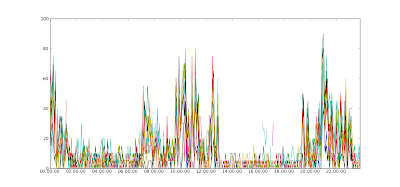One of the most frequent grumbles I see on Twitter from locals concerns the performance of Virgin Media’s broadband service. For months, people ask whether other locals are having problems. A few helpful folk repeat what they’ve been told by the help desk – which has generally been along the lines of “we’re aware of the problem and it will be fixed by … [insert month of your choice here].”
This wasn’t good enough for Steve Berryman – he takes up the story:
“In about October 2011 (I can’t remember the exact date it was so long ago) we (my brother and I) noticed exceptionally poor internet performance at home. We have the 50Mbit package (the most expensive) and first figured, “It’s only a couple of days. Must be a small fault somewhere. They’ll fix it.”. However, the problem persisted. We called and asked what was wrong. “A fault in the area. It will be fixed in November”. OK. These things happen. An irritation, but no big deal.
November came and went. December came and went. There were some days when it was ok. Many where the connection was mediocre at best, and some where it was simply unusable. This is all during peak hours, of course: those hours when we’re actually at home, wanting to use the internet. The few days I worked from home, it was lightning quick.
We rang back again in January to ask what was going on. “Oh, yes that will be fixed in February”. Not the November we were first promised. A bit of complaining, but the date wasn’t too far away. We’re patient guys. Other people in the area were complaining of similar issues so it wasn’t an isolated problem. Surely that meant that the fix was a priority?
February came and went. On ringing back (and getting a fault reference as well!) we were told March was the new fix date. I went on holiday for much of March but was surprised to see when I came back in April that there were still issues. “Oh, the new date is end of April”. Great. Quite angry now. Paying for months of service that we aren’t getting. We had asked previously about compensation for the months it was broken but only one time were we offered anything: £15 off that month’s bill. I’m not actually sure if it ever came off either… Other requests were fruitless. The first line support are unknowledgeable, don’t seem to have any authority and sometimes are plain rude.
The April date has come and gone. It’s now the end of May and I’m told there is a new fix date – late September. That will bring it to almost a year of poor quality (tonight, as I type this, I am struggling to load the lightest of web pages) internet that I am paying quite a lot for.
I’ve had many conversations with first line on the phone. Many tweets between the @virginmedia twitter social support staff and all they can do is apologise, tell me it won’t be fixed for months, ‘these things sometimes take longer than anticipated’, and agree that it’s not great. I’ve had enough. In my opinion it’s a capacity problem. It’s fine during the day on weekdays, but evenings and weekends it all goes to hell. They are still heavily advertising in my area.”
Thanks Steve. To prove that this isn’t just anecdotal evidence of a poor service, Steve has started measuring packet loss using the tool mtr and recording it in 5 minute intervals. “I believe a problem on this scale should be a priority, and certainly not something that takes a year to resolve,” says Steve.
Here’s the techy stuff: “The graphs show the packet loss for 20 pings on each hop of the route between home and Google’s servers. Each line represents a hop of the route (hence the messiness) and the higher the line, the worse the packet loss. Here is a Wikipedia article on packet loss, what it means, why it’s bad and what can cause it. http://en.wikipedia.org/wiki/Packet_loss. I have strong suspicions that the NW6 Virgin Broadband problems are due to congestion on the line. They’ve known about the fault for some time – the fault reference is f001829169.”
I’ve included one of Steve’s graphs – in this case from May 23rd, but you can visit his site to see the updates.

Thanks to Steve for letting me reprint his words. The original appears here.




